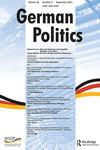Angela Merkel and the CDU Quota Curse
IF 2.1
3区 社会学
Q2 POLITICAL SCIENCE
引用次数: 5
Abstract
During the 2019 centennial celebration of women’s suffrage in Germany, Chancellor Angela Merkel conceded that gender quotas are important and that the ultimate goal must be gender parity. Merkel’s legacy in terms of advancing women within her own party, however, is mixed. Surrounding herself with a tight circle of women professionals and arguably modelling success for fellow women party members, she nonetheless remained noncommittal on parity. Her support for the ‘quorum’, a 33 per cent inner-party ‘quota light’ adopted in 1996, appeared muted and inconsequential. Throughout Merkel’s chancellorship, the CDU failed to adhere to this quota in party offices and among parliamentarians. Analysing gender-disaggregated party and electoral data with insights gleaned from semi-structured interviews with party members, this article sheds light on CDU quota implementation challenges. We assess inner-party politics and policies within the context of the CDU’s struggle to attract female voters, to respond to an increasingly progressive Women’s Union, and to accommodate its Bavarian sister party, the CSU. We find that despite a reframing of its gender equality agenda and strong inner-party mobilisation, the CDU majority still resists quotas. The mismatch between party statutes and electoral system, moreover, obstructs quota implementation, making gender parity in the CDU an elusive goal.安格拉·默克尔和基民盟的配额诅咒
在2019年德国妇女选举权100周年庆典上,总理安格拉·默克尔承认,性别配额很重要,最终目标必须是性别平等。然而,默克尔在党内提升女性地位方面留下的遗产喜忧参半。她周围有一个由女性专业人士组成的小圈子,可以说是为其他女性党员树立了成功的榜样,尽管如此,她对男女平等问题仍未作出承诺。她对“法定人数”的支持,即1996年通过的33%的党内“配额光”,似乎是沉默和无关紧要的。在默克尔担任总理期间,基民盟未能在党内办公室和议员中遵守这一配额。本文分析了按性别分类的政党和选举数据,并从对党员的半结构化访谈中收集了见解,揭示了基民盟配额执行方面的挑战。我们在基民盟努力吸引女性选民、回应日益进步的妇女联盟(Women 's Union)以及适应其巴伐利亚姊妹党基社盟(CSU)的背景下,评估党内政治和政策。我们发现,尽管重新制定了性别平等议程,并进行了强有力的党内动员,但基民盟多数派仍然抵制配额。此外,政党章程和选举制度之间的不匹配阻碍了配额的实施,使基民盟的性别平等成为一个难以实现的目标。
本文章由计算机程序翻译,如有差异,请以英文原文为准。
求助全文
约1分钟内获得全文
求助全文

 求助内容:
求助内容: 应助结果提醒方式:
应助结果提醒方式:


